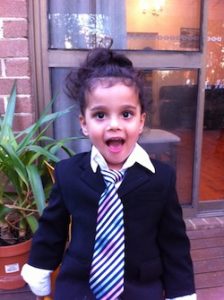Naftali Silva

Naftali was 2 years old when we travelled from Australia to Sri Lanka to visit his grandfather and cousins. Naftali has had medical problems since he was born and one of his most concerning problems is reactive airway. This means that every time he gets sick, he has trouble breathing and coughs for days after. He had surgery 3 months before we went to Sri Lanka to remove his tonsils, adenoids and to place grommets in his ears. A few doctors told us that we shouldn’t take him to Sri Lanka. However, we went against their advice knowing that Naftali’s grandfather was dying and this would be their last opportunity to meet each other.
About halfway through our visit, Naftali was bitten by a mosquito and two little lumps appears on his thigh. After a few days, he developed a very high fever and stopped eating. He didn’t want to be moved or touched and just lay on the bed looking miserable. I also noticed that the two little bites were now large, swollen and bright red. We took him to the doctor and insisted on a blood test to check for dengue fever. I had taken many medicines from Australia and immediately began giving him an antibiotic and antibiotic cream for the bites.
The next day we returned to the doctor with the blood test results that showed some kind of infection. The doctor told me to continue with the antibiotic and he would feel better in a few days. By this time, Naftali was throwing up the antibiotic and panadol [acetaminophen] and I told the doctor that he wasn’t keeping the medicines down. After I said that, the doctor decided that we should take him to the hospital for a day of IV antibiotic and fluids. He said we could take him home once the vomiting settled. The doctor sent us to a private hospital and told us he would meet us there.
We arrived at the hospital and within a few hours, Naftali got worse. He was having trouble breathing, his feet swelled, his fevers were very high and he was completely unresponsive. I remember taking a photo of him in the hospital, thinking it would be my last photo. I also remember thinking that it was lucky I had taken out travel insurance so I could at least bring his body back to Australia. I called my family in tears.

The doctor told us that he suspected meningitis and after consulting with an Australian doctor, they began giving him Rocephin through an IV line to treat the meningitis. He improved slightly but the doctors needed to know exactly what was wrong in order to treat him. Over the next few days he had many tests including a lumbar puncture to test for meningitis where they had to draw out some of his spinal fluid. When this test and all the others came back negative, they switched to another antibiotic and he began to improve further. It was then that the doctor told me that he had a bacterial sepsis. I had heard him use the word sepsis before, but I couldn’t really understand his accent and when I tried to look it up, I had heard it wrong so I couldn’t find it.
When I was finally able to research what it was, I realised how lucky we were that the doctor had sent us to the hospital. By the time he deteriorated, we were already there and they could start helping him right away. Slowly, Naftali started talking and eating again. I heard him laugh again which I never thought I would. After a week, Naftali was finally strong enough to go home.
As soon as he was released from hospital, we left Sri Lanka in a big hurry. I didn’t even get a chance to thank the doctor who had saved his life. I also didn’t get a chance to thank Naftali’s grandfather for paying for his time in hospital. He passed away not long after we left Sri Lanka. Every day I am grateful that we still have Naftali with us and I realise what could have been.
Source: by Ellie Nagel (Naftali's mother)






























